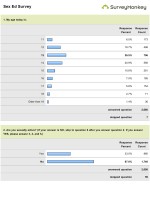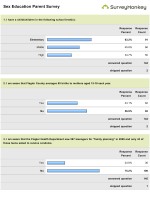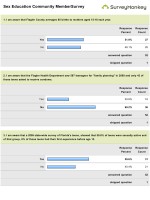
On Thursday evening, the Flagler County School Board will hold a public forum on sex education in the district, and what direction sex-ed should take, should the board decide to move away from an abstinence-only curriculum. The district is considering moving to something called abstinence-plus: the focus would remain on abstinence, but students would be taught about sexually transmitted diseases and how to prevent them. Students would also learn about contraception, condoms and healthy behavior. (The forum is scheduled for 6:30 p.m. in the board chambers of the Government Services Building in Bunnell.)
The district now has the final numbers of the broadest survey of parents, residents and students conducted on the matter in the district. It also has many pages of actual comments from respondents—students and adults.
Click On:
- Students’ Comments, Complete Set, Part 1
- Students’ Comments, Complete Set, Part 2
- Parents’ Comments: Complete Set
- Community Members’ Comments: Complete Set
- Get Some: Sex Ed Survey Now Open to Flagler Parents; Student Survey March 23 and 24
- Sex-Ed in Flagler: School District Prepares to Move Away from Abstinence Only
The survey includes the voices of 2,660 students from grades 6 through 12. Those were mostly conducted in school Survey of adults were less successful: 144 parents participated, and 52 “community members,” or adults with no children in schools, took part.
The final numbers are not as startling as some of the preliminary numbers released last month. But with twice as many students’ responses in the tally, particularly those of older students, the trend is the same: A third of students age 10 to 18 are sexually active, 17 percent of those became active before age 10, but most of those who did became so between age 13 and 15—and almost two thirds used condoms.
Among adults, the most startling number is the divide between adult perceptions of sexual activities among teens and the actual reality: among parents, just 34 percent said they were aware that half of Florida’s teens were sexually active, according to a statewide, 2009 survey, or that 8 percent had their first sexual experience before age 13. The awareness rises to 60 percent when “community members” are queried.
But both students and adults are supportive of more sex education in school, and even of dispensing condoms. Among “community members,” almost 70 support making condoms available in school clinics, and 42 percent support starting sex education in 6th grade. (That question did not make a distinction between sex education within the abstinence only curriculum as opposed to “abstinence-plus,” but it did emphasize more information. Among parents, support for dispensing condoms at school clinics is at 57 percent. More than 40 percent would make them available in middle school.
Students’ favorability for “more information about having sex and what to do to stay healthy” rises to 74 percent, though as with parents, support for condom availability among students is at 57 percent.
The respondents’ comments paint a more immediate picture of adults’ and students’ ideas, anxieties, and thinking.
The students’ comments reflected a huge range of reactions, both because of the broad range in ages surveyed (from 10 or 11 year olds to 18 year olds) and students’ inherently broad-ranging ideas on the subject. Some of the comments underscored the lack of awareness about sexual matters: “Why are we doing this and why do you have to use a condom when you have sex?,” one student asked. “I have no idea what sex is,” another wrote.

Some, inevitably, are intended probably less than seriously: “Give us lessons about sex and what kind of positions you can do.” There are also spates of “sex is amazing” and “sex is awesome.” Many comments may seem revealing, but not in light of the survey numbers: “I have had condoms since 6th grade from my dad teaching me, never thought it would happen in 8th grade but it did.” Or “Schools should give out condoms and have a class with how to use them.” Or: “4 of my friends had kids before 15.”
Students’ comments are typically shorter and somewhat less lecturing than those of adults, focusing more on self-informed prescriptive approaches: “I think that sex is a part of human nature and should be taught to students as a precaution,” one student wrote. “No matter how much anyone says the risks, if you don’t how to practice it you will be in trouble. I <3 Sex.”

There are also disturbing revelations: “Okay for questions 2,” one student wrote, referring to the question that asks: “Are you sexually active?” The student continued: “It was because I got raped before I turned 10 but I was too young to know it was wrong and I thought it was good at the time because of how it felt.” Another wrote: “I was raped twice and I believe it should be added in the talk.”
Among parents, those less favorable to sex education in school usually pointed to home values or religion as a reason: “I still believe abstinence should be taught,” one wrote. “I would not want my child to be able to get condoms at school. We are raising our children in a Christian home and are teaching Christian principles. I feel the home is where this choice should be taught not schools.”
Another wrote: “I don’t think that an abstinence only approach is the way to educate teens in these times. It’s just not realistic and is too closely related to religious beliefs, which should not be taught in a public school. Luckily I have a close relationship with my child and I am able to discuss these things openly. And I am aware of my child’s choices and opinions on sex. I feel that a more realistic approach to sex education would better serve our teenage children. An older teacher preaching to them is not going to have much of an affect and I feel that it could very definitely backfire. I think peers are the best possible role models for our kids.”

“I teach at FPCHS,” one wrote, in opposition to condoms being dispensed at school. “Having condoms available would make the statement that ‘it is ok to have sex.’ The students would display the condoms in school.”
And one person lent an unusual perspective to opposition to current sex education curriculums, whether abstinence only or abstinence plus: “Although I do approve of appropriately taught sex education in schools,” the person wrote, “I do not approve of the schools teaching the benefits of monogamous ‘heterosexual’ relationships. I do NOT nor will I allow anyone else to teach my minor child to discriminate against homosexuals or any other group.”





























Liana G says
“Although I do approve of appropriately taught sex education in schools,” the person wrote, “I do not approve of the schools teaching the benefits of monogamous ‘heterosexual’ relationships. I do NOT nor will I allow anyone else to teach my minor child to discriminate against homosexuals or any other group.”
Thanks for pointing this out. I totally agree with you!
SoccerMom says
Regarding the accuracy of the statistics, I know that a large group of middle schoolers wrote blatant mistruths. The boys greatly exaggerated their answers and treated the survey like a joke. They had a wonderful time outdoing each other with their answers. While I am sure that some students cooperated, I would hesitate to set policy by anonymous surveys.